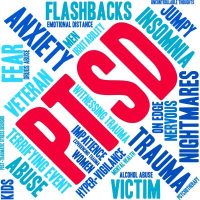The Five Kinds of PTSD

Many people are surprised to learn that Post Traumatic Stress Disorder is one of the most common car crash injuries. Normally, trauma causes head injuries. But PTSD is different. A stress-induced chemical change causes this brain injury. Stress causes the amygdala to swell and the hippocampus to shrink. As a result, the brain’s emotional response center overwhelms its logical response center.
PTSD, like other kinds of head injuries, comes in different degrees. All these degrees cause serious and usually permanent injuries. As a result, an Altamonte Springs personal injury lawyer can obtain substantial compensation for these victims in court. This compensation usually includes money for economic losses, such as medical bills, and noneconomic losses, such as pain and suffering.
Normal Stress Response
NSR is the PTSD version of a mild concussion. These injuries are especially common in low-speed parking lot fender-bender accidents.
Mild concussions, which resemble accident shock in many ways, usually go away on their own, after a little rest and TLC. Likewise, NSR usually goes away on its own, if victims talk out their feelings and attend a therapy session or two.
As is the case with all other levels of PTSD, an Altamonte Springs personal injury lawyer connects victims with doctors who focus on crash-related PTSD and other unique kinds of auto accident injuries.
Acute Stress Disorder
ASD is the PTSD version of a severe concussion. Severe concussions usually require rest and medical treatment. If victims don’t get these things, their head injuries get worse. Most Acute Stress Disorder victims were in high-speed vehicle collisions that required some hospital care. If victims don’t receive prompt and proper treatment, ASD escalates into a more serious kind of PTSD.
Diagnosis issues plague car crash PTSD cases. There’s a very fine line between NSR and ASD. Both conditions have similar symptoms. Initial misdiagnosis, which is very common in these cases, has severe consequences.
Uncomplicated PTSD
A one-time extremely stressful event, like a life-threatening car crash, causes uncomplicated PTSD. The aforementioned chemical imbalance causes symptoms like:
- Hypervigilance,
- Depression,
- Nightmares,
- Anger, and
- Flashbacks.
Full-blown PTSD is very difficult to treat, mostly because available PTSD drugs only treat the symptoms. Nevertheless, some combination of drugs and therapy almost always works. But finding the right combination is a long, trial-and-error process.
Complicated PTSD
This form of PTSD is related to the aforementioned concussion-type PTSD conditions. The cumulative effect of low-speed wrecks and other semi-stressful events, like a job loss or relationship breakup, causes complicated PTSD. This injury is a lot like a severe traumatic brain injury (sTBI) which requires extensive treatment.
Alas, most patients don’t get the treatment they need. sTBIs send millions of Americans to hospital emergency rooms every year. But most complicated PTSD victims don’t even see their doctors.
If a pre-existing condition, like a prior stressful event, contributed to a crash-related injury, like complicated PTSD, maximum compensation is usually available.
Comorbid PTSD
The most serious kind of PTSD is like a fatal brain injury. These victims usually have multiple mental health issues and abuse drugs or alcohol, typically to self-medicate their PTSD symptoms. Usually, doctors must treat all three things (the PTSD, other mental health condition, and substance use disorder) at the same time. Such aggressive treatment is usually the only way to avoid a PTSD-induced suicide.
Connect With a Hard-Working Seminole County Lawyer
Injury victims are entitled to substantial compensation. For a confidential consultation with an experienced personal injury lawyer in Altamonte Springs, contact Goldman Law, P.A. The sooner you reach out to us, the sooner we start working for you.
Source:
pmc.ncbi.nlm.nih.gov/articles/PMC6659351/
